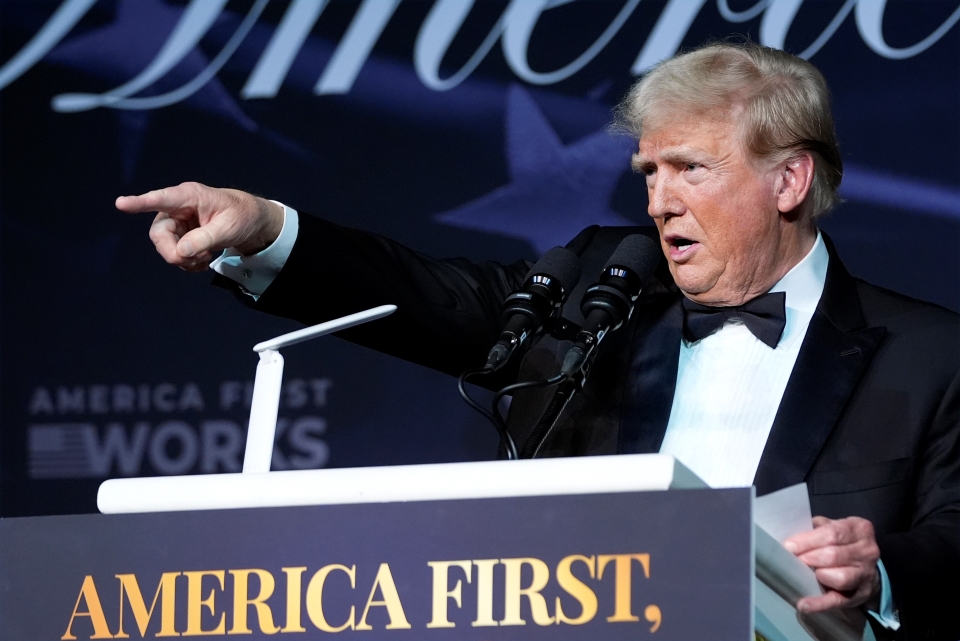Business and political leaders in Canada say there will be pain if Donald Trump follows through on his pledge to impose a 25 per cent tariff on all Canadian goods, but they note the hurt will happen in his country as well.
The president-elect posted to Truth Social on Monday he will sign an executive order imposing a 25 per cent tariff on all products coming in to the United States from Canada and Mexico.
He said the tariff will remain in place until both countries stop drugs, in particular fentanyl, and people from illegally crossing the borders.

The threat was met with a call to action by the Canadian Chamber of Commerce, which said Canada needs to urgently adapt its approach to trade talks with the U.S.
The chamber’s president and CEO Candace Laing said that “being America’s ‘nice neighbour’ won’t get us anywhere.”
“President-elect Trump’s intention to impose 25 per cent tariffs signals that the U.S.-Canada trade relationship is no longer about mutual benefit. To him, it’s about winners and losers — with Canada on the losing end,” said Laing in a statement on Tuesday.
“We’re facing a significant shift in the relationship between long-standing allies. Canada’s signature approach needs to evolve: we must be prepared to take a couple of punches if we’re going to stake out our position. It’s time to trade ‘sorry’ for ‘sorry, not sorry.’”
Prime Minister Justin Trudeau spoke with Trump after the president-elect’s announcement on social media that a senior official described as productive and focused on trade and security.
The two leaders agreed to stay in touch. Trudeau also had calls with Ontario Premier Doug Ford and Quebec Premier François Legault.
Previous modelling by the Canadian Chamber of Commerce suggested a 10 per cent across-the-board tariff would reduce the size of the Canadian economy between 0.9 and one per cent, resulting in around $30 billion per year in economic costs.
It estimated the U.S. would see around US$125 billion a year in economic costs.
University of Calgary economist Trevor Tombe, who authored the chamber’s report on that modelling prior to the U.S. election, said on X that the Canadian economy would take an annual real GDP hit of around 2.6 per cent when updating for a 25 per cent tariff.
That would equate to around $2,000 per person, he said.
Ford posted on social media that a 25 per cent tariff would be devastating to workers and jobs in both Canada and the U.S.
Legault tweeted that everything must be done to avoid the tariffs, and British Columbia Premier David Eby posted Trump’s tariffs “would hurt Canadians and Americans alike.”
“Canadians must stand united. Ottawa must respond with strength,” Eby tweeted.
Alberta Premier Danielle Smith said in a social media post that the Trump administration has “valid concerns related to illegal activities” at the border. But she noted vast majority of her province’s energy exports to the U.S. are “delivered through secure and safe pipelines” which she said “do not in any way contribute to these illegal activities.”
Canadian American Business Council CEO Beth Burke said in a statement Monday night that Trump’s proposal would harm businesses on both sides of the border and would “erode the economic and geopolitical strength of North America.”
The Canadian dollar traded for 71.02 cents US early Tuesday morning, down from 71.53 cents US on Monday.
Some warned a potential blanket tariff would also be bad for businesses on the U.S. side of the border.
“For the American businesses and for American consumers, this would mean higher prices and increased costs for input and less competitive business environment for America as well,” the Canadian Chamber of Commerce’s chief economist, Stephen Tapp, said in an interview late Monday.
Things would be even worse if other countries retaliated with tariff walls of their own. In that case, Canadian incomes would fall by 1.5 per cent and productivity by 1.6 per cent, the chamber’s report said.
Tapp said in this case it would amount to USD $2,000 less in purchasing power for the American consumer. The numbers are even higher with a 25 per cent tariff.
He suspects that increased cost would not be appreciated in a U.S. that voted for Trump’s promises of reducing inflation and the cost of living.
“Consumers that have just gone through the pandemic and large inflation, then difficult times for Americans and Canadians, I think they would really not be happy to see prices go up and the sticker shock that they would feel after prices came in.”
A joint statement from Deputy Prime Minister Chrystia Freeland and Public Safety Minister Dominic LeBlanc said Ottawa will continue to discuss border security issues with the incoming administration.
Even the threat of tariffs is bad for investment in Canadian business, Tapp said.
“It would be bad for overall sentiment in Canada for the consumer side,” he said.
Trump’s first tenure in the White House did show that Canadian businesses are resilient, Tapp said. They should prepare for a rush of orders before any tariffs come into play while also bracing for uncertainty and chaos in the four years that follow.
“We saw that we should take Trump seriously.”
–The Canadian Press–
